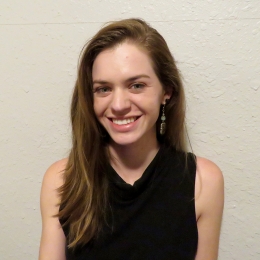INDIANAPOLIS—Annalee Johnson-Kwochka, a graduate student in the Clinical Psychology Ph.D. program, has received a training grant of just more than $45,000 from the National Institute of Health and National Institute on Drug Abuse. The money will help support her as she looks into how the impact of stigma related to substance use disorder (drug addiction) for justice-involved youth (youth who have been arrested or on probation) can affect their ability to access and engage in care.

“Since undergrad, I have always had an interest in mental illness stigma. Existing research suggests that stigma, or negative attitudes about people with mental illness or substance use disorders, has a significant negative impact both on the availability of treatment and the likelihood that people will seek treatment,” said Johnson-Kwochka. “Lately, I’ve been interested in investigating areas where negative attitudes about mental illness have a big impact on health outcomes. Substance use disorders are incredibly stigmatized, and there is not very much research on this area, particularly with adolescents.”
There are a couple of goals Johnson-Kwochka hopes to achieve over the next year. The first will be to understand the youth’s perspectives on the role stigma plays in limiting treatment availability and engagement. The second goal works in tandem with another project being led by Matt Aalsma, Ph.D.
“A large part of the data from this project is coming from Dr. Matt Aalsma’s Family Based-Justice Improvement Project (FB-JIP), which aims to link justice-involved youth with community-based substance use disorder treatment. When youth participate in this study, we can track whether or not they engage in treatment, and with my project, we will be able to link treatment engagement to their scores on measures of mental illness stigma. So, we’ll be able to see whether stigma has the negative impact on health care access that we think it does,” explained Johnson-Kwochka.
She will spend the next year collecting data from surveys and interviews from those who are participating in FB-JIP and her study.
“We ask youth and their parents to complete surveys at the intake appointment with juvenile probation, and then 3- and 6-months after that. In addition, I will be doing qualitative interviews with youth, their parents, and staff stakeholders to gather detailed perspectives,” explained Johson-Kwochka. “There is very little existing research in this area, so qualitative and narrative information can be beneficial in allowing us to gather information that we might not know how to measure quantitatively via surveys yet.”
Johnson-Kwochka is excited about this research and hopes others will consider how stigma can affect vulnerable groups of people.
“I am incredibly excited to be able to devote most of my time to this project, which is what this grant allows me to do. I think this is a really important topic to study and it’s encouraging that NIH feels similarly,” said Johnson-Kwochka.
Johnson-Kwochka would like to thank her sponsors for their help with the grant application: Michelle Salyers, Ph.D., Matthew Aalsma, Ph.D., Bernice Pescosolido, Ph.D., and Patrick Monahan, Ph.D.